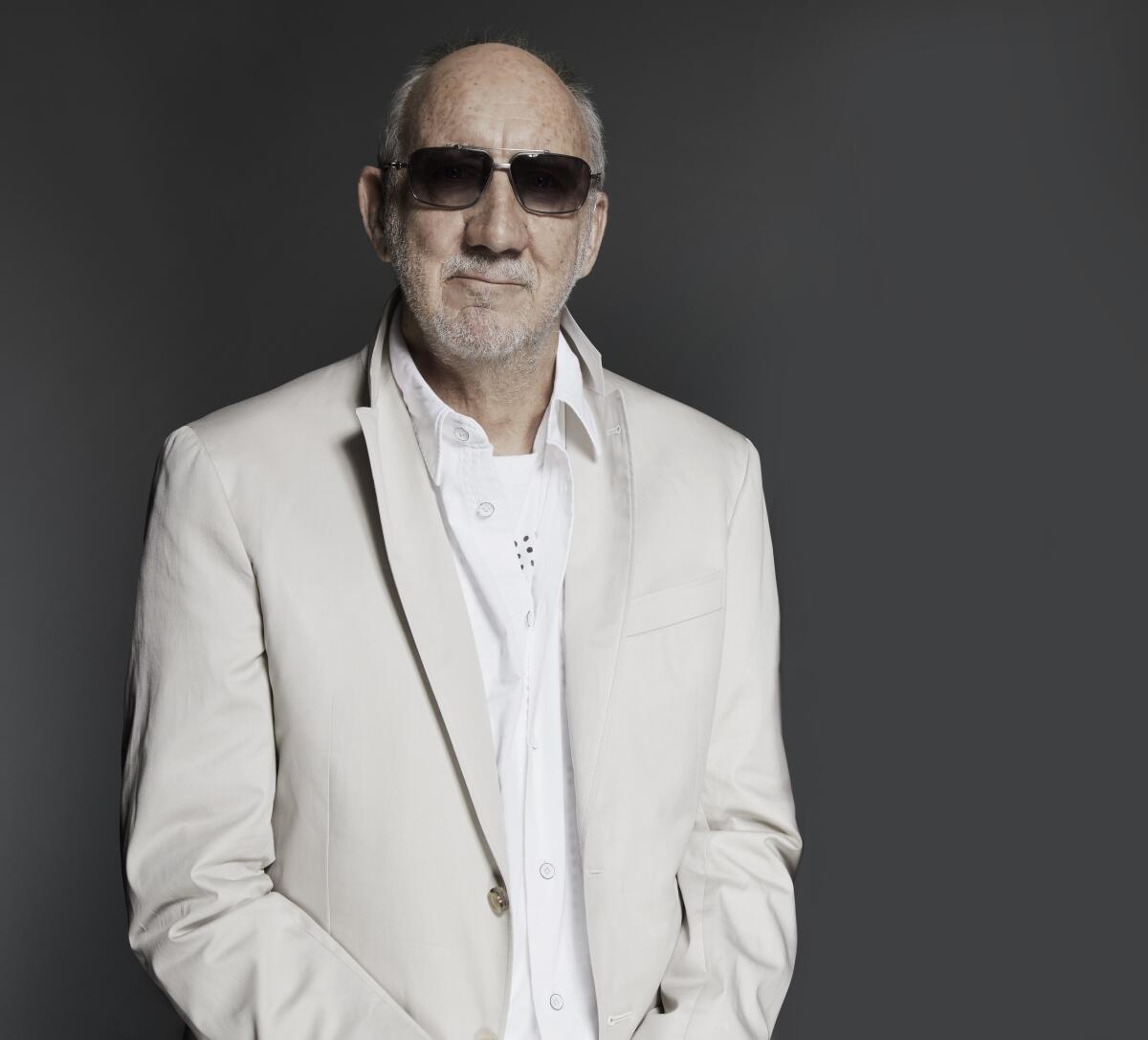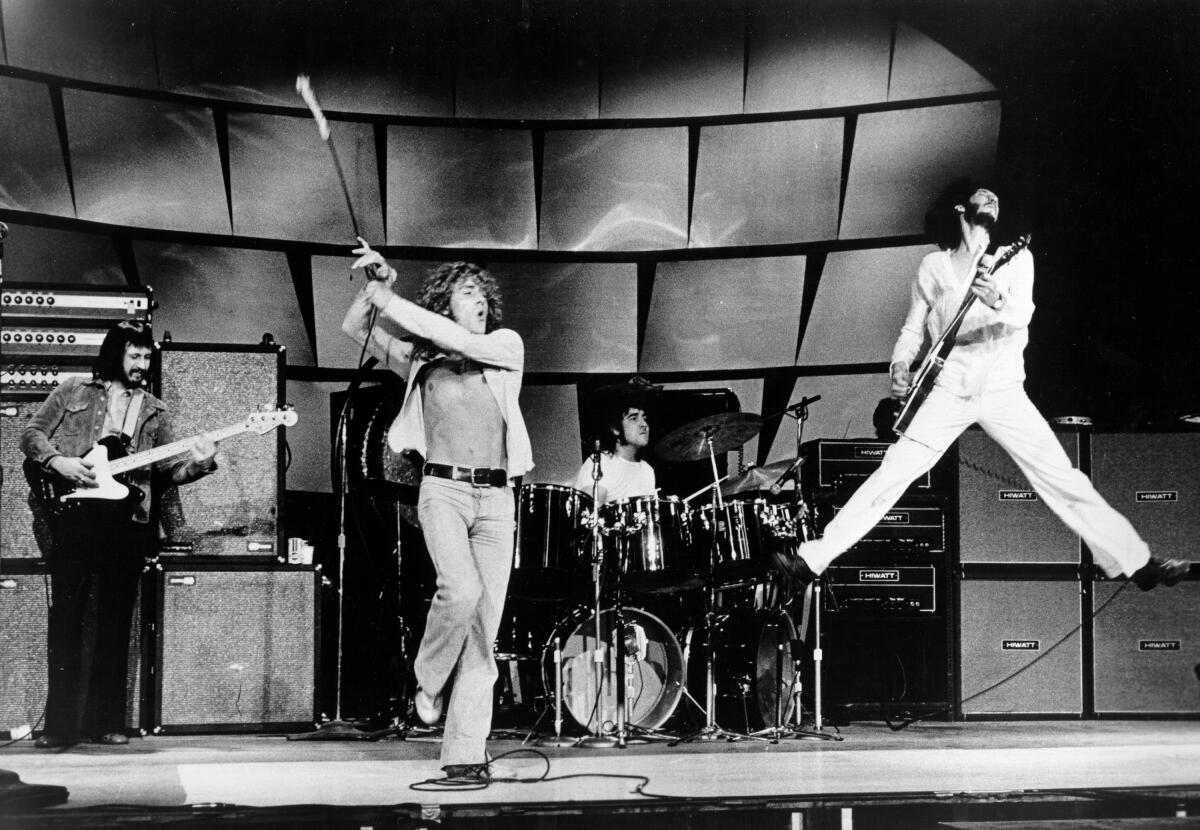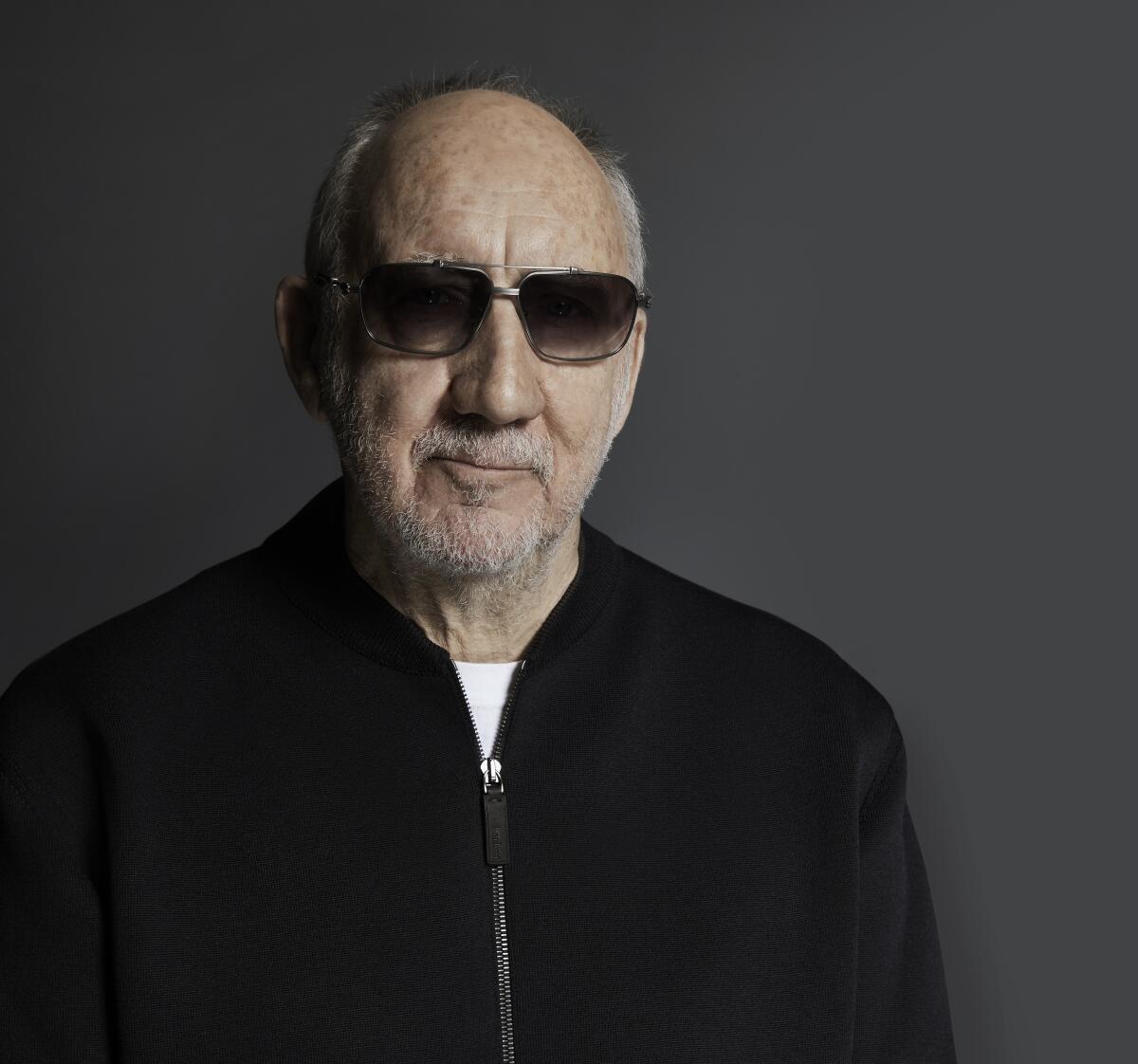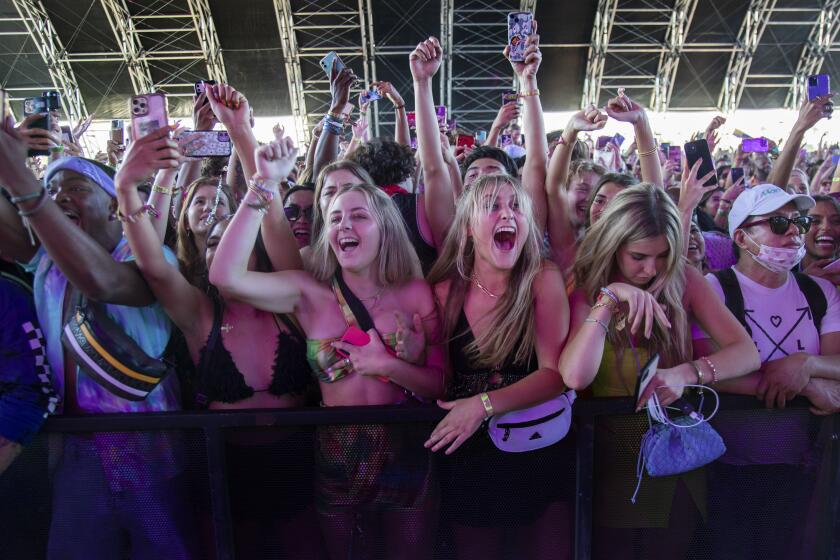Pete Townshend on the state of the Who and creating a dream supergroup with Led Zeppelin

- Share via
In February, bassist Guy Pratt tweeted a photo of himself, drummer Ged Lynch and Pete Townshend in a recording studio, which prompted hopeful speculation that the Who’s guitarist and main songwriter was working on his first solo album since “Psychoderelict” in 1993.
“I’m not making a solo album,” Townshend says. “I don’t feel the need right now to produce new work.”
Since he published his memoir, “Who I Am,” in 2012, Townshend, 76, has spent lots of time revisiting his life and career. The title of the Who’s current tour, The Who Hits Back! (coming to the Hollywood Bowl on Nov. 1) hints at its retrospective nature: In a typical set, the band, which includes Zak Starkey on drums and Townshend’s younger brother Simon on guitar, plays only three songs recorded since 1983. Instead, the show focuses on three totemic albums from the late 1960s and early ’70s: “Tommy,” “Quadrophenia” and “Who’s Next,” all accompanied by an orchestra.
Townshend also recorded an Audible Original, “Somebody Saved Me,” for the audiobook and podcast service’s Words + Music series, which combines an artist’s personal ruminations with songs recorded exclusively for Audible. Townshend rerecorded 10 songs for “Somebody Saved Me,” some solo and some with the band of Pratt and Lynch. There’s a rousing new version of “Rough Boys,” a highlight of Townshend’s 1980 album “Empty Glass,” but only three songs from the Who’s catalog. (The project is available beginning Friday.)
Pat Benatar, Duran Duran, the Eurythmics and Carly Simon were the other top vote-getters. The induction ceremony will take place in L.A. in November.
Townshend’s ambivalence about the middle period of his career is a recurring theme in “Somebody Saved Me,” which centers three events that quaked the Who: drummer Keith Moon’s death in 1978, at the age of 32; the 1979 concert in Cincinnati at which 11 fans, most of them teenagers, died in a stampede; and the 2002 death of bassist John Entwistle, who had a cocaine-induced heart attack on the eve of a major Who tour. These are the touchstones of the story but Townshend, as is his wont, attaches a range of associated memories, opinions and comical confessions. (When he broke his wrist in a bike accident in 1991 and a doctor told him he’d never play guitar again, Townshend urgently asked if he’d be able to masturbate.)
“I’m so pale and weedy,” Townshend sings in “Rough Boys,” and viewing himself as an outsider often has powered his music. But that’s only part of the story. In his autobiography, Who singer Roger Daltrey likened Townshend to “a scorpion with a warm heart. No matter how happily the conversation is ticking along, you’re constantly aware of the sting in its tail.”
On a Zoom call the afternoon before the Who played in Tampa, Fla., the loquacious Townshend, wearing a light gray T-shirt with a white ring at the collar and a thick silver chain, discussed his Audible Original, and the period when he became rich, left the Who and was “productive but not particularly successful.” There were a few stings in his words, especially when he mentioned, more than once, his frustration with Daltrey.

“Somebody Saved Me” covers a long period of time, from 1978 to 2002. Did you do any research about that period?
I looked at interviews I’ve done in the past, and my autobiography. But it wasn’t meant to cover such a large period. When the idea was presented to me, it was to cover the period when I was under the most difficulty as an artist, which was after Keith Moon’s death and after Cincinnati. I had a very good solo deal with Atlantic, and we managed to pull off a spectacular album deal for the Who with Warner Bros. I was under great pressure, with respect to writing songs.
In 1982, I decided that I’d muddled everything up and had taken on too much, and I announced that I was leaving the Who. I expected the band to go on, to be honest, in one form or another, and was surprised when it didn’t. Since then, Roger Daltrey has attempted to build a solo career, particularly recently, because I don’t tour as much as he would like. So I don’t know why he didn’t continue the Who, but he didn’t.
That period was jam-packed with stuff, some of it incredibly intense, including the beginning of the breakdown of my marriage to Karen, my first wife, whom I met when we were kids.
Audible was offering big money — half a million dollars. That made me think twice about it, but I just didn’t want to do it, so I turned it down.
Then I was having medicals for this Who tour, and my doctor happens to be a guy who was the founder of Teen Cancer Trust in the U.K., which is a big charity for Roger and me and the Who’s manager, Bill Curbishley. We do [benefit] shows every year at the Royal Albert Hall. So I thought, f— it, I could get Audible to give the money directly to Teen Cancer America, which during the lockdown had suffered hugely through lack of funds.
I knew it would be tough to revisit such a sensitive time, but it also turned out to be huge fun.
I’ll be 77 at my next birthday [May 19], and I’m probably at the end of heart-searching in my career. I’m not going to be able to change much about the way that I feel about what’s happened. I’m probably at the end of my crazy days. So I decided to wade through it.
You tell a story about seeing Rolling Stones drummer Charlie Watts cry at Keith Moon’s funeral. You ask yourself why you’re not more upset. And you also say, “I feel very little when someone close to me dies.” Have you figured out why that is?
I haven’t [laughs], and it’s not something I’m entirely comfortable about. I was touched and dismayed by Charlie Watts weeping. Nobody else was.
Eventually I do start to feel deeper feelings that I would describe as grief. It could have to do with the fact that in 1967, I started following Meher Baba, the Indian teacher. His whole thesis is rooted in karma and the repetitive lifetimes of reincarnation. The idea of dying and being born again isn’t such a good deal, in fact, if we have to start all over again and try to get it right.
My first response to death is a sense of trying to ameliorate what happened and put the situation right. Try to help the people who do feel grief and are suffering hugely. It’s a mirror of my role in the Who, to some extent. After Keith died, I felt that I was not just the skipper of the ship but also the engineer and doing the annual paint job.
That’s an indication of how I operate. For example, I’m not touring because I want to, I’m touring because I feel I need to. It’s easy and fulfilling but it’s not something I live or die for. Céline Dion is a good example of somebody that, despite the tragedy she’s been through, feels driven to work, work, work.
A slew of acts have canceled tour dates as COVID cases rise once again, casting a pall over what was shaping up to be a record-setting concert season.
In 1976, your accountant discovered that you had a bank account neither of you had known about, with $1.5 million of publishing money. Overnight you became rich, but that didn’t work out well for you, did it?
It didn’t, no. In the early days of the Who, everything was split four ways except my writing royalties, which sustained me. I don’t know how the other guys got on, for heaven’s sake. We toured a lot and had hit records, but we didn’t make any money. After [the 1969 album] “Tommy,” somebody made a lot of money, but it wasn’t us.
People like Elton John and the Stones all seemed to be living in castles in the South of France. I had a little house in the London suburbs, with three bedrooms. This period of difficulty, of dissolution, disenfranchisement, loss, confusion, was sparked by a moral shift. I’ve always felt happy to say to people in our audience, “I’m like you. I don’t live that highfalutin Gucci lifestyle.” It protected me from the idea that there was any decadence going on around the Who. Roger Daltrey talks about being surrounded by three addicts all his life. He had addictions of his own, by the way, but we won’t talk about that.
With respect to wealth, it was tied up in these two fantastic record deals. The Who got a $13 million advance, which is equal to about $350 million today, for five albums over seven years. It felt to me as though money was going to solve all my problems. One thing it didn’t buy me was time. It didn’t buy me ideas. [laughs] It didn’t help me to write the songs we needed to make these albums special.

You released solo albums in 1980 and 1982, and Who albums in 1981 and 1982. Did that workload contribute to your leaving the Who?
I don’t want to make it seem like Roger is the enemy in all this, but he’s not an easy guy to write for. “Rough Boys” was a song I was afraid Roger wouldn’t want to sing if I presented it to him, because it was a celebration of macho gayness.
Roger would sometimes shock me and say, “I really like this,” and it would be a song with a ukulele or something. I’d tend to throw s— at the wall. For every song we would record, I often felt I had to write 10.
You also describe the death of Keith Moon, and later of John Entwistle, as an opportunity for the Who to find a different sound. Have you and Roger ever discussed whether one of you will go on if the other one dies?
No, but I think it’s hanging in the air as an issue. When John died, the Who had a tour booked, and it was about to start the next day. There was a feeling that we were on our own, just Rog and Pete. Whether or not it’s true that we are able to carry on because we were the original driving principals in the Who, I don’t know. John was an extraordinary musician and a great creative. Keith was a much-underrated drummer. But also, both of them were troublesome. John could only play very loud, which made it difficult for Roger. Keith’s personal life was chaotic, and we feared for him all the time.
So suddenly, there was this clean relationship, just me and Roger. I’m a songwriter, he’s a singer. We can do something with this. There’s nothing good about losing John, who was the first guy I was in a band with, when we were 12 years old. He was always very sweet to me. [sighs] It would be wrong to say that he loved me, but he liked me and we got on very well.
John’s death was in midstream — he was still active, a brilliant player. It felt to me like Keith completed his cycle, do you know what I mean? I didn’t feel Jimi Hendrix completed his cycle, or Brian Jones. They died too soon. In the last months of Keith’s life, we were in contact almost every day. He was happy, and not in that chaotic manner Keith always felt he had to strive for, to create an explosion of happiness and joy, or an explosion of something. He was finished with his old life, and nothing would ever compare to what he had done already.

When the story begins, you’re in your early 30s. What did you believe in at 30 that you no longer believe?
Wow, I don’t know. I write in a journal every day, and have done for a long time. When I go back and read those journals, what I see is not any great change. I just see the same f— story every time. (laughs) Every now and then there’ll be a revelation, but often things that are obvious to everybody else. It might be just the idea that when you go on holiday, you don’t bring a recording studio with you, you bring a novel. [laughs]
Here’s a fanciful question. The Who still have their original singer and guitarist but no rhythm section. The Beatles have only their rhythm section. Is there a marriage to be made?
[laughs] Zak Starkey now plays drums with the Who, so we get to see Ringo quite a bit. And Macca [Paul McCartney], I’m very close to. But I don’t think the Who and the Beatles will happen. Good idea, though.
I’ve always felt there was a real potential for something explosive and nuts with the Who and Led Zeppelin. The principals in Led Zeppelin are much more musicians than they’re perceived to be by the heavy-metal fans who just think it’s about heavy s—.
You’re a famously articulate writer and talker. Do words ever let you down?
Everyday language is trickier than doing an interview. In the years when I drank, and shot from the hip, I rarely got into the kind of trouble I could get into today. I once said some stuff about Led Zeppelin, that I’d never heard one of their songs, and about Eric Clapton, that after his experience as an addict he’d never play as well as when he was a young man, and in every case, I’ve been forgiven. I suppose that’s because people see you as a big-mouth rock star, and this is what they expect from you, to be full of s—.
More to Read
The biggest entertainment stories
Get our big stories about Hollywood, film, television, music, arts, culture and more right in your inbox as soon as they publish.
You may occasionally receive promotional content from the Los Angeles Times.












